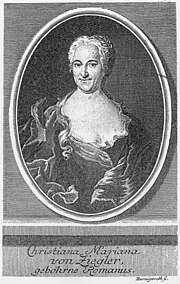Sie werden euch in den Bann tun, BWV 183
| Sie werden euch in den Bann tun | |
|---|---|
| BWV 183 | |
| Church cantata by J. S. Bach | |

Christiana Mariana von Ziegler, author of the cantata text
|
|
| Occasion | Exaudi |
| Performed | 13 May 1725: Leipzig |
| Movements | 5 |
| Cantata text | Christiana Mariana von Ziegler |
| Bible text | |
| Chorale | by Paul Gerhardt |
| Vocal | SATB soloists and choir |
| Instrumental |
|
Sie werden euch in den Bann tun (They will put you under banishment),BWV 183, is a church cantata by Johann Sebastian Bach. He composed it in Leipzig for Exaudi, the Sunday after Ascension, and first performed it on 13 May 1725. The work includes some unusual woodwind scoring, two oboes da caccia and two oboes d'amore.
Bach wrote the cantata in his second year in Leipzig for the Sunday Exaudi, the Sunday after Ascension. The prescribed readings for the feast day were from the First Epistle of Peter, "serve each other" (), and from the second Farewell discourse in the Gospel of John, the promise of the Paraclete, the "Spirit of Truth", and the announcement of prosecution ().
Some of the cantatas composed by Bach in his second year were chorale cantatas, a format he chose for services between the first Sunday after Trinity and Palm Sunday. For Easter he had returned to cantatas on more varied texts. Nine of the cantatas for the period between Easter and Pentecost are based on texts of Christiana Mariana von Ziegler, including this cantata. Bach later assigned it to his third annual cycle. Ziegler begins the cantata with the same quotation from the gospel as an unknown poet one year earlier in Sie werden euch in den Bann tun, BWV 44, the prediction of persecution of Christians. "They will put you under banishment, but the time will come, when, whoever kills you will think that he does God a service by it" (). She continues stressing the lack of fear possible for a follower who relies on "Jesu Schutzarm" (the protective arm of Jesus). In movements 3 and 4 she refers to the beginning of the gospel, the spirit who will assist. The closing chorale is the fifth stanza of Paul Gerhardt's "Zeuch ein zu deinen Toren".
...
Wikipedia
